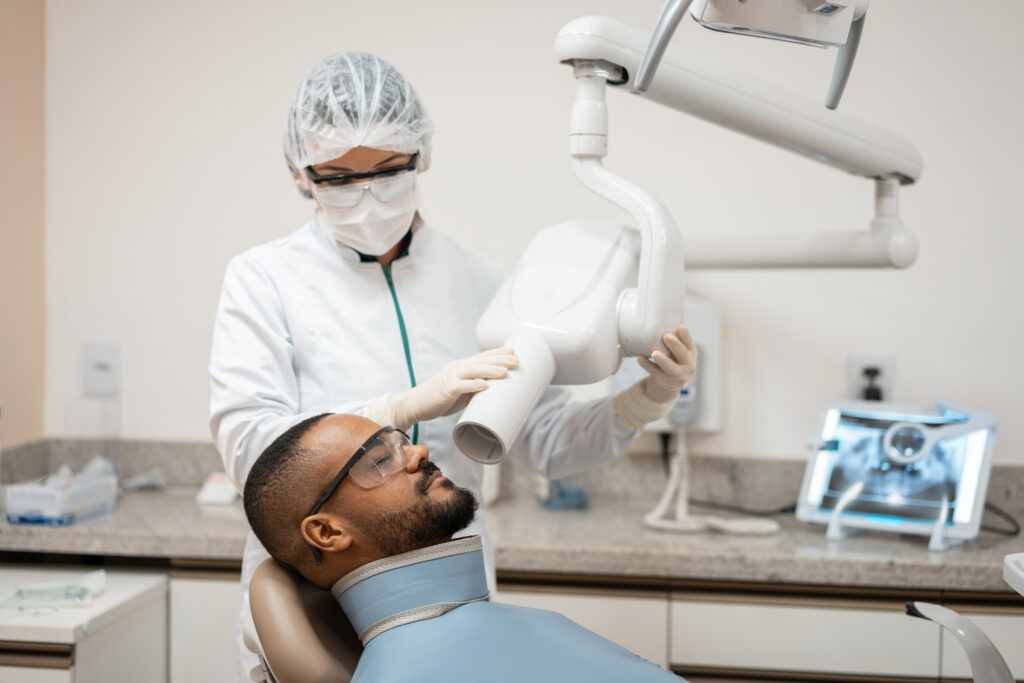
Do dental assistants take X-rays? The short answer is yes. The longer answer; depends on your role at a dentist’s office. Fortunately, taking X-rays is something you will learn about in the Dental Assistant program at Meridian College.
How Do X-Rays Work?
X-rays use an invisible form of light. Unlike light rays visible to the naked eye, X-rays penetrate soft tissue without being absorbed. They help create images of the teeth, gums, and jaw. One of the roles of a dental assistant is to take high-quality images that let dentists peer into the mouth without performing invasive procedures.
Why are X-Rays Done in a Dental Office?
X-rays, or radiographs, are essential for diagnosing dental issues like cavities and abscesses. They allow dentists to see teeth, nerves, and bones below the gum line. They’re used preventively and to diagnose dental issues when patients have symptoms.
X-rays can detect many different dental issues, including:
• Cavities
• Abscesses
• Loose crowns and fillings
• Changes in the root canal
• Impacted teeth
• Irregular bites
• Abnormal tooth development
• Cysts & Tumors
What Types of Dental X-rays a Dental Assistant is Responsible For?
There are five X-rays typically done in a dental office. They include:
Periapical X-rays
Periapical X-rays capture images of one or two teeth in the mouth from the crown above the gumline to the root below. Periapical X-rays provide a complete view of a tooth that helps dentists diagnose changes in teeth structure that needs intervention.
During a periapical X-ray, the dental assistant places a small strip of film in a plastic holder in the patient’s mouth. Attached to the plastic holder is an X-ray frame that mirrors the position of the film, helping the dental assistant align the X-ray machine properly. The patient bites down on the holder while the X-ray is taken.
Bitewing X-rays
Bitewings capture complete sections of both the upper and lower teeth. They diagnose and prevent issues from impacting the patient’s mouth. The process is similar to taking periapical X-rays. All five methods are reviewed in the Dental Assistant program at Meridian College.
Full Mouth X-rays
Full-mouth X-rays merge periapical with bitewing radiographs. These X-rays give the dentist a baseline impression of a patient’s oral health that can later be used for comparison.
Occlusal X-rays
Occlusal X-rays image the top and bottom of the mouth. Pediatric dentists use them to help monitor the development of teeth that haven’t yet broken through the gums. A dentist may order them in adults to help find tumors or cysts.
Panoramic X-rays
Panoramic X-rays are extraoral. The film isn’t placed in the mouth, but the patient must maintain a complete smile to properly align the jawline. Instead of film, a rotating arm captures a two-dimensional image of the entire mouth.
Panoramic X-rays assess a patient’s bite or dental issues that may extend to the jawbone. They’re also used to plan implants, dentures, braces, and extractions.
What Does a Dental Assistant Do When Taking X-rays?
Some of the related duties of a dental assistant that takes X-rays include:
• Preparing patients for X-ray procedures by explaining what they can expect.
• Using lead aprons and protective devices to minimize that patient’s radiation exposure.
• Setting machine parameters to obtain clear and high-quality images.
• Proper positioning patients and equipment
• Processing X-ray images for dentists to review.
• Reviewing and assessing the quality of the images to ensure there are no artifacts.
• Maintaining accurate patient records.
• Performing maintenance and quality control checks on X-ray equipment.
• Providing patients with education about post-procedure care
Want to Learn More?
The Dental Assistant training program at Meridian College provides extensive hands-on training, including a school externship at a dental office where you will assist the dentist in treating actual patients.
Meridian College also has dedicated school instructors who offer dental assisting training that can help you get an entry-level position at a dentist’s office or dental clinic. You get to work in real-world situations and use your training from classroom lectures to further your skills during lab work.
Contact Meridian College today to learn more about becoming a dental assistant.